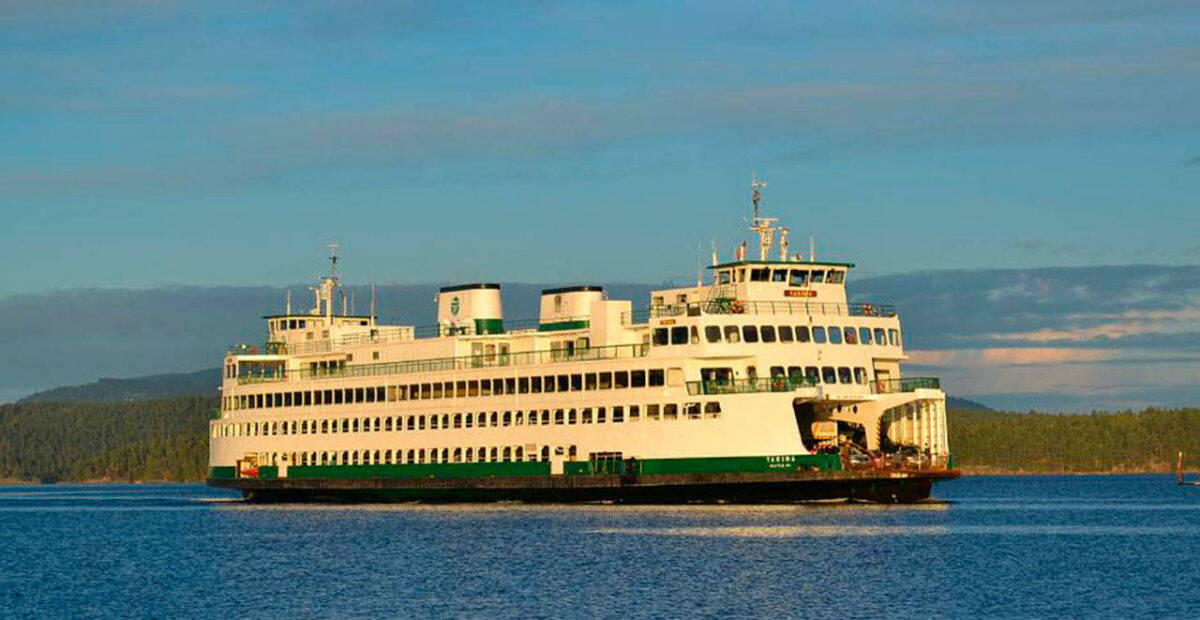San Juan Islands’ ferry riders turned up in high numbers to a public online video call with Washington State Ferries to discuss service changes. These meetings are held twice a year in coordination with the ferry advisory committee.
“2021 was a very challenging year for many businesses and agencies and Washington State Ferries is no exception,” said Patty Rubstello, the head of WSF. “We lost members of our team to COVID-19 and continue to experience staffing shortages throughout our agency, due to the wave of retirements and the global shortage of qualified mariners.”
The meeting covered highlights from 2021, the current “challenge steps” WSF is taking to address service impacts, proposed ferry investments, and a Q&A section. There were about 220 participants.
A poll was taken at the beginning of the meeting to see where most participants were joining from, with the San Juan Islands taking the majority at 32%.
This was not a surprise to WSF, as Director Of Government Relations at Washington State Ferries John Vezina said they are aware that sailing to the islands has been especially difficult, even before COVID.
“If they’re going to chemotherapy appointments, if they’re trying to get to work, especially medical professionals during this time, they not only face challenges getting back and forth to Anacortes,” said Vezina. “They’ve had challenges just between islands, which includes students, medical workers, and hospice workers. It’s been really a tough time for them.”
Vezina also added that there are many farmers in the islands who have not been able to have their livestock processed or slaughtered for months because processors do not want to risk the trip to the islands, especially with food that could spoil.
With that in mind, he said WSF has been trying to prioritize the San Juan routes, but they were told by the attorney general’s office that because they are a state highway, they do not have the right to discriminate against other riders due to where they live. So while they want to prioritize the San Juans, it is difficult to do so completely under the state highway laws.
However, medical units, school buses, and livestock are given preferential loading. People who need priority loading due to medical needs can have their physician write a letter to WSF. These options apply to all routes — not just the islands.
What lies behind most of these issues is a staffing shortage, Vezina said, adding that staffing is the key to stabilizing the island routes, which he said could continue to be an issue for months.
Rubstello remarked that with COVID taking a toll on WSF staff, it is difficult to restore the proper ferry schedules. She said that since the Omicron variant arose, they’ve had 53 employees call out in the last 10 days and 245 covid-related call-outs, making it hard to maintain service levels.
“We are just not seeing the COVID cases tapering off,” she said, despite the current vaccination requirement for all WSF employees. “I know many of you are frustrated and feel like we’re not serving you this ferry service that you need and rely on, and I have to say, I absolutely agree with you. I’ve only been in this role for almost a year now, and I’m really amazed at what’s been able to be achieved by these. Dedicated employees at Washington State ferries with the limited resources that have been provided. Pre-pandemic this organization was barely getting by, now throw in the pandemic and it just isn’t sustainable. It exposed that we are not a resilient organization.”
Despite the feeling of defeat, Rubstello said WSF is working hard to be able to serve all ferry-accessible communities.
She also pointed out that there have been positive experiences with the ferries this year, including responding to seven lifesaving events; ferry crew helping over 20 people who were in danger throughout the year; supporting 400 medical transports; and reporting 189 whale sightings to Quiet Sound, a platform that lets others know where to sail cautiously.
Along with that, a new innovation coming from WSF is hydroelectric vessels. This will not make it to the islands any time soon, though, as they first need to figure out how to electrify the terminals. The long routes also make the hydroelectric vessels an issue of safety at this point, since they are brand new to the system. They will have two boats running in the Seattle area and keep one as an emergency backup vessel.
It has been a long time coming for WSF to update the fleet. Many of the boats have serious corrosion and are half a century old and lack of funding has gotten in the way of proper boat upkeep, which makes it more likely that mechanical issues will come up.
“We’re trying to be equitable in a situation in which resources are extremely tight,” Vezina said of the fleet.
Things are constantly changing with WSF in the unpredictable state of the pandemic. To keep up-to-date, Rubstello said updates are constantly being posted to the WSF website.
“We have seen high levels of burnout and stress from the ongoing impacts of this two-year pandemic. Our crews are working a lot of overtime, and the added stress of the COVID-19 protocols makes it more challenging for them to do their jobs,” Rubstello said. “So, please, if you have the opportunity, please, thank those at the terminals. Those that are on the vessels for their hard work. I know everybody’s frustrated, but they’re doing the best that they can.”



